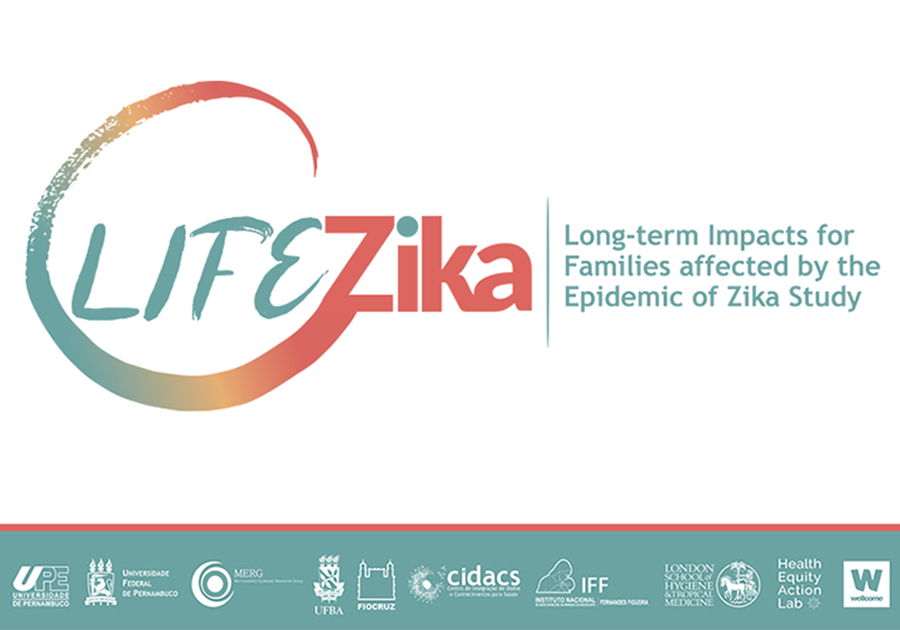
A new, seven-year research collaboration will study the long-term health and learning needs of children whose mothers were infected with Zika virus during pregnancy.
The study, known as the Long-term Impacts for Families affected by the Epidemic of Zika (LIFE Zika) Study, brings together experts from the London School of Hygiene & Tropical Medicine (LSHTM), the Universidade de Pernambuco, the Universidade Federal de Pernambuco, and the Fundação Oswaldo Cruz (Fiocruz) in Brazil. The co-led LIFE Zika Study is supported by a £3.6m Wellcome Collaborative Award in Science, with the majority of funding going directly to Brazilian research partners, and LSHTM being awarded £766,352 for its role.
Using their expertise in epidemiology, data linkage, and social science methods, the team will follow school-aged children in Brazil with and without prenatal exposure to Zika virus to understand the long-term impacts of Zika infections during pregnancy on affected children and their families.
Zika virus is primarily spread by mosquito bites. Infections during pregnancy can pass through the placenta and disrupt foetal development, leading to structural anomalies, such as microcephaly, and missed developmental milestones. These are collectively recognised as Congenital Zika Syndrome.
Elizabeth Brickley, co-lead of the LIFE Zika Study and Professor of Epidemiology and Planetary Health at LSHTM, said: “Although Zika virus transmission has declined worldwide, children with Congenital Zika Syndrome and their families continue to confront devastating health and social consequences from the 2015-2017 pandemic.”
Ricardo Ximenes, co-lead of the LIFE Zika Study and Professor of Tropical Medicine at the Universidade Federal de Pernambuco and Internal Medicine at the Universidade de Pernambuco, said: “Eight years ago, the eyes of the world were on Brazil and the Zika-related public health emergency, but attention has moved on. We believe it is time to bring Zika back onto the scientific agenda.”
Investigating the effects of Zika through different life stages
Since the emergence of the microcephaly epidemic in the northeast of Brazil in 2015, investigators affiliated with the LIFE Zika Study have continuously tracked health and development in children with Congenital Zika Syndrome.
Demócrito Miranda-Filho, a LIFE Zika Study researcher at the Universidade de Pernambuco who has led the follow-up of the Microcephaly Epidemic Research Group Pediatric Cohort, said: “As Congenital Zika Syndrome is a new disease that was only identified among newborns eight years ago, the consequences of Zika virus infections during pregnancy for later child development remain unknown.”
This new funding will enable the LIFE Zika Study to extend the follow-up of affected children to the age of 13 and learn about Congenital Zika Syndrome across different stages of children’s development. Using comprehensive clinical assessments, researchers will compare health and learning needs between children with and without prenatal Zika virus exposure. The project will also bring together data in the Zika Brazilian Cohorts Consortium, which represents all the cohorts across Brazil that have followed up children exposed to Zika virus during pregnancy.
The findings of this research will help to guide the planning and organisation of clinical care for children and shed light on the kinds of adaptations that are needed for children with Zika-related disabilities to participate in social activities including school.
Understanding the societal impacts of Zika and preparing for the future
Dr Sandra Valongueiro, a LIFE Zika Study researcher at the Universidade Federal de Pernambuco, said: “It is important to remember that children with severe cases of Congenital Zika Syndrome may require life-long care. This caregiving is typically provided by mothers and may incur significant health, social, and economic impacts.”
The LIFE Zika Study will use social science methods to gain an understanding of the broader health and social impacts for family members of children with Congenital Zika Syndrome. The researchers hope this evidence will inform the development of public policies promoting the social protection of children with Congenital Zika Syndrome and their families.
With an eye towards epidemic preparedness, the study also aims to improve understanding of how researchers can more effectively engage with affected communities in the scientific responses to public health emergencies.
Dr Bethânia Almeida, a LIFE Zika Study researcher at CIDACS/Fiocruz, said: “This project aims to evaluate the public’s perceptions and concerns related to data production, usage and sharing data during and after public health emergencies, using Zika virus epidemic and Congenital Zika Syndrome as case studies.”
The LIFE Zika Study will launch on 20 March 2024 in Recife, Pernambuco, Brazil at an international scientific meeting with more than 50 speakers representing research, policy, advocacy groups, and families of children with Congenital Zika Syndrome.
The event will be held in a hybrid format and registration is open to the public: https://mergzika.com.br/.
Find out more about The Centre for Epidemic Preparedness and Response (CEPR), and become a member.
Our postgraduate taught courses provide health practitioners, clinicians, policy-makers, scientists and recent graduates with a world-class qualification in public and global health.
If you are coming to LSHTM to study a distance learning programme (PG Cert, PG Dip, MSc or individual modules) starting in 2024, you may be eligible for a 5% discount on your tuition fees.
These fee reduction schemes are available for a limited time only.
